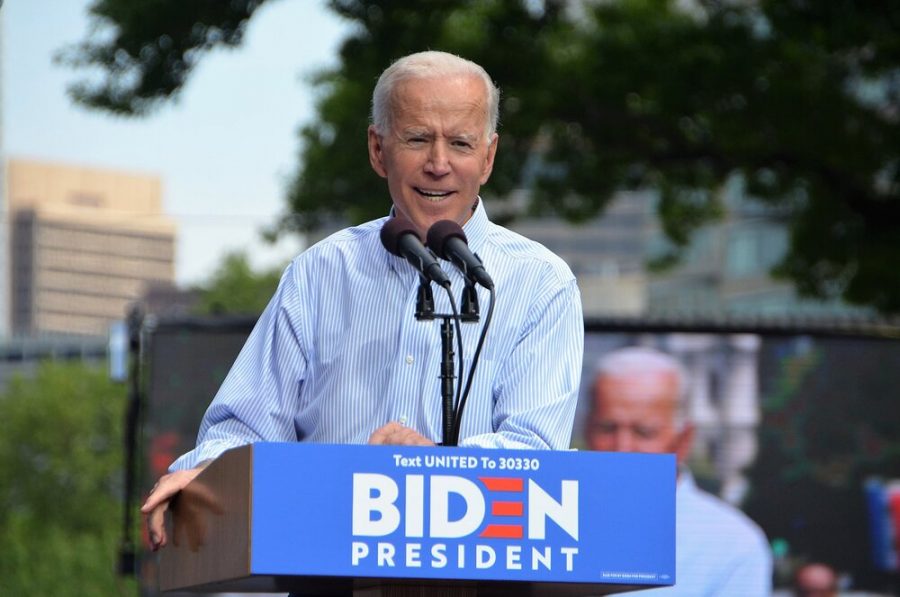The Electoral College and what it means for 2021
Then-presidential candidate Joseph R. Biden Jr. speaks at an event. Incumbent President Donald J. Trump has mounted numerous legal challenges against Biden’s victory.
A new chapter in the United States began with the election of Joe Biden. It looked like a fresh start, one that would bring change and relief to a country struggling with a pandemic. That is, until President Donald Trump revealed an alternative. Declaring the election fraudulent, President Trump requested a recount in key battleground states. Such states, like Pennsylvania, Arizona, and Florida, are ambiguous in their political leanings and tend to be heavily campaigned in. Requesting a recount took time away from the election, and it could have denied Biden the presidency.
President Trump claimed that illegal immigrants had voted in the November election. That dead people had voted. That people had voted multiple times. None of this was true. Regardless, Trump gathered a legal team, headed by Rudolph “Rudy” Giuliani, former New York City mayor and President Trump’s personal attorney. As President Trump’s key lawyer, Giuliani took these allegations to court, presenting claims of widespread voter fraud. The Trump legal team requested recounts in Georgia, a state with over five million votes to tabulate. Georgia, usually a red state, was a blue state for the first time since 1992. The courts upheld these recounts, and America waited to see what would become of this.
Meanwhile, President Trump’s legal team waged fierce battles against the Supreme Court as they fought the results of the Michigan and Georgia elections. In both cases, the Supreme Court upheld the legitimacy of the elections. Wayne County Circuit Judge Timothy Kenny said that the claims of one of Giuliani’s key witnesses’ testimonies, Mellissa Carone, “simply are not credible.” Carone’s testimony quickly made its way to SNL, where the cast mocked the Michigan trials. At one point, Giuliani even shushed her in the middle of her testimony. After the testimony, the results of the election remained widely until December 14th, when the Electoral College solidified President-elect Biden’s victory and top Republican politicians, including then-Senate majority leader Mitch McConnell (R-KY), finally congratulated Biden on his victory. Even the attempted coup that President Trump incited on January 6th could not prevent Congress from certifying the results of the election.
Without a doubt, Joe Biden will be the 46th president of the United States of America.
What does that mean for America? At present, President-elect Biden has a COVID-19 task force ready to go, with a priorities of his being the rapid distribution of approved vaccines. At a campaign event on September 2, Biden laid out a plan to reopen schools safely and to improve the learning experience before they open. “For American educators, this is a great day for you all. You’re going to have one of your own in the White House,” Biden said at his acceptance speech, referring to his wife Dr. Jill Biden, who teaches at a community college.
Economic change is another key part of Biden’s plan. Already, Biden has announced that the US will re-enter the Paris climate accords and work to make America a more ecologically sustainable country. Joe Biden will bring change, and he is tackling the pandemic head-on.
“It doesn’t matter who you voted for, where you stood before Election Day. It doesn’t matter your party or your point of view,” Biden said in November. “We can save tens of thousands of lives if everyone would just wear a mask for the next few months.”

David is a junior at Beaverton High School specializing in political news writing for The Hummer. He is originally from San Francisco and is also involved...







n1njachikin • Mar 2, 2021 at 4:51 pm
Okay, many things wrong in this article, although you have a knack for writing opinion.
“Requesting a recount took time away from the election, and it could have denied Biden the presidency. ”
This is true, although your phrasing makes it sound like Trump is doing this illegally or at the very least maliciously, which is far from the truth. Recounts have been initiated many times and have had huge impacts, such as Bush v Al Gore.
“President Trump claimed that illegal immigrants had voted in the November election. That dead people had voted. That people had voted multiple times. None of this was true. ”
False, many of these actually ARE true. Where Trump was wrong is that it was enough to overturn the election.
“Even the attempted coup that President Trump incited on January 6th could not prevent Congress from certifying the results of the election. ”
I don’t care if this is an opinion article or not, this is a blatant lie. There was no coup. A coup requires the military to take over. There was no military involvement. And Trump did not incite the violence, as was found in the impeachment trial. All you have to do is read the former president’s speech to see that he specifically stated that they were going to “peacefully and patriotically march over to the Capitol building.”
“Economic change is another key part of Biden’s plan. Already, Biden has announced that the US will re-enter the Paris climate accords and work to make America a more ecologically sustainable country.”
A simple google search will reveal that the P.C.As have done nothing for the environment. In fact, multiple ratifying countries’ emissions went UP.
“Joe Biden will bring change, and he is tackling the pandemic head-on.”
Joe Biden’s covid plan is no different than Donald Trump. Trump was giving a million vaccines a day. What was Biden’s plan? 100 million shots over then next hundred days. What does that equal? A million shots a day. He and vice president Harris went so far as to say that there had been no vaccine before they entered the White House, which isn’t true.
All in all, you are good at writing opinion articles. But a few things that were said here are just false or misrepresenting.